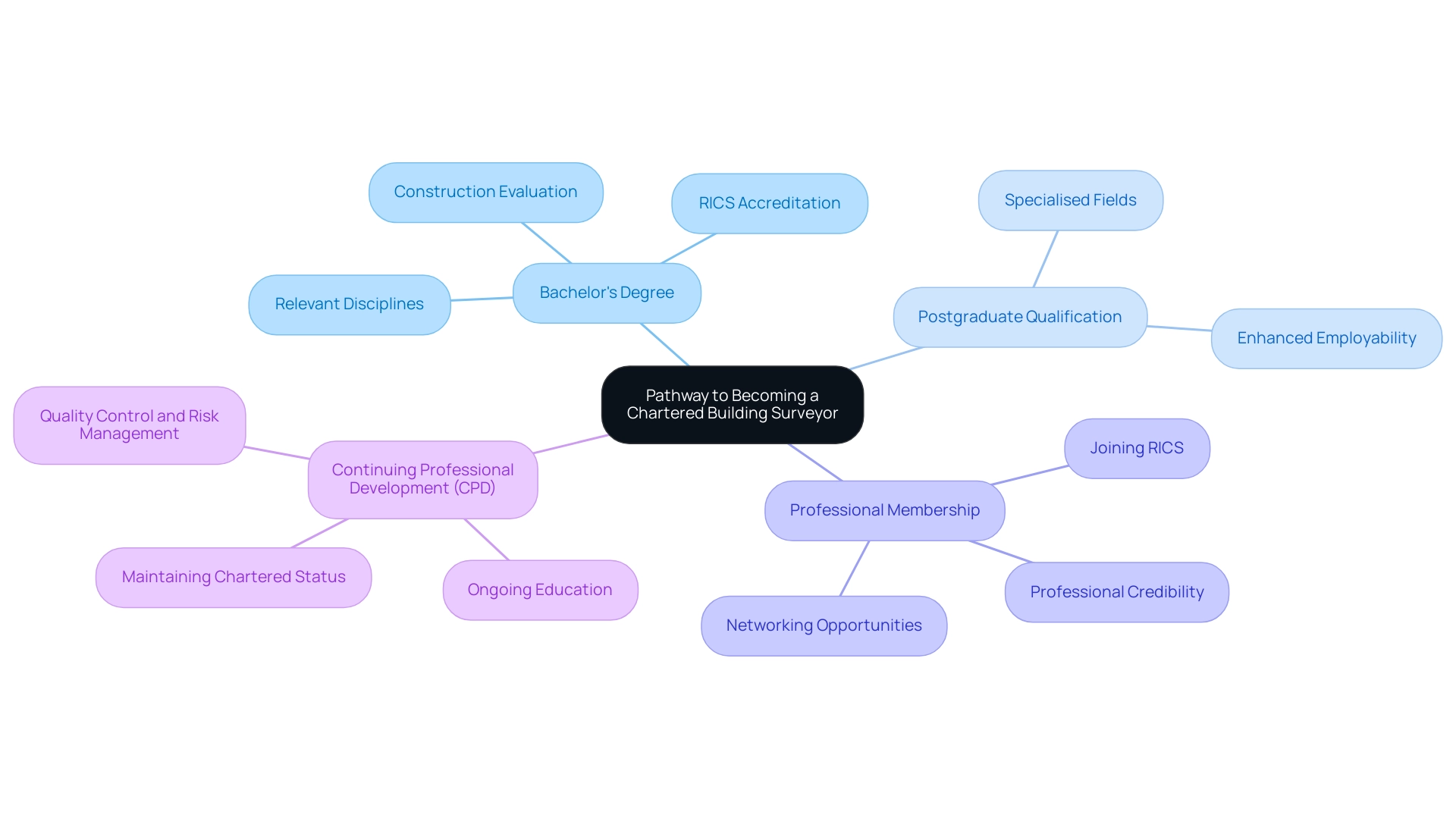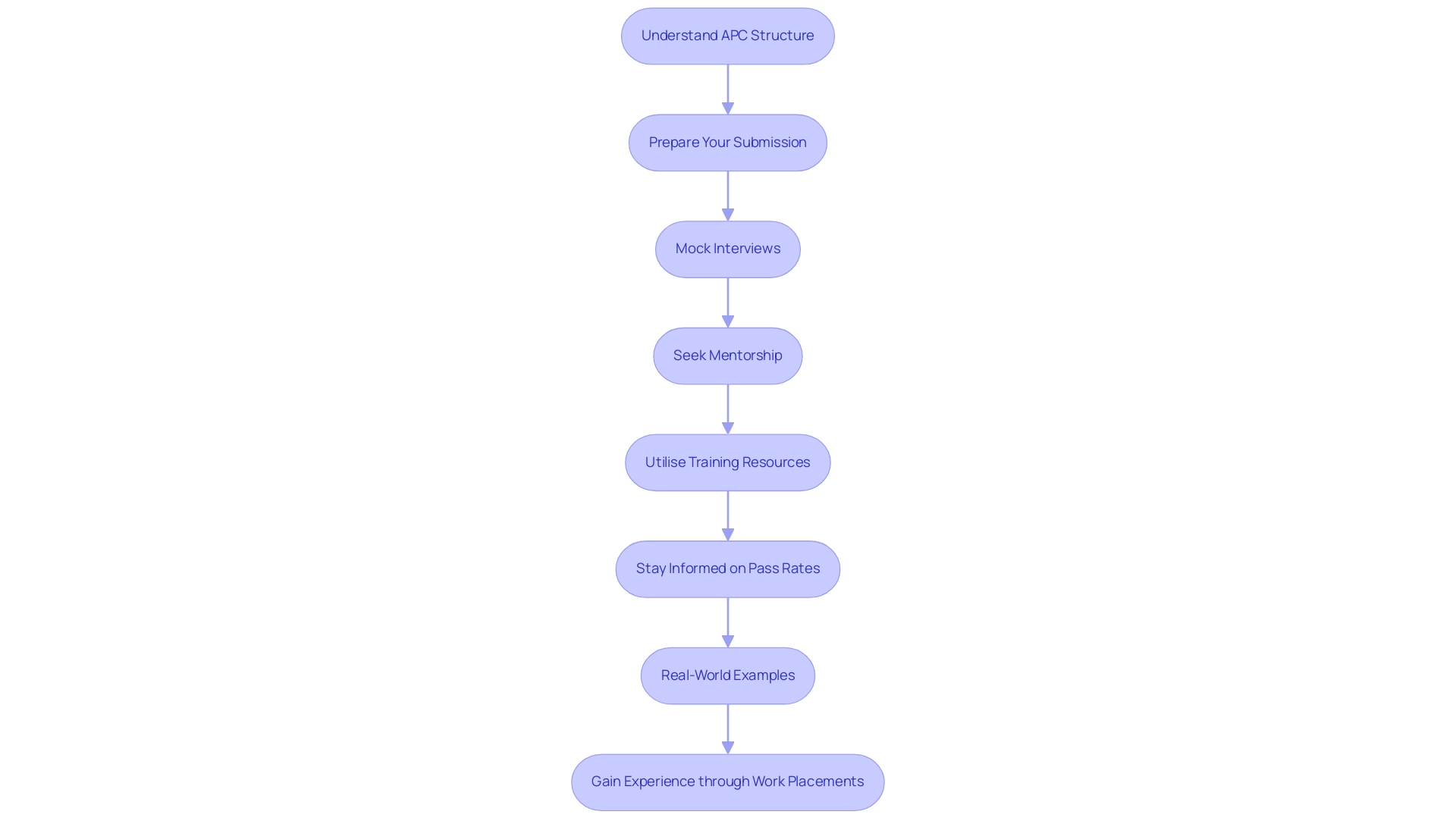
Overview
To become a chartered building surveyor, candidates must first obtain an RICS-accredited degree. Following this, they should:
- Pursue postgraduate qualifications
- Gain professional membership
- Engage in continuing professional development (CPD)
These steps are not merely procedural; they are essential for establishing a robust foundation in property assessment and management. Furthermore, they prepare candidates for the RICS Assessment of Professional Competence (APC), which is crucial for achieving chartered status. Engaging in this comprehensive pathway not only enhances professional credibility but also ensures a deep understanding of the industry, ultimately leading to a successful career in building surveying.
Introduction
In the competitive realm of building surveying, aspiring professionals must navigate a complex landscape of qualifications, experience, and continual development to achieve chartered status. The Royal Institution of Chartered Surveyors (RICS) sets the standard for excellence, requiring candidates to:
- Pursue accredited educational pathways
- Gain practical experience
- Engage in ongoing professional growth
As the construction industry evolves, so too do the opportunities for advancement. It is essential for future chartered building surveyors to understand the nuances of their field. This article delves into:
- The essential qualifications
- The significance of work experience
- The assessment process for chartered status
- The myriad career pathways available
Equipping readers with the knowledge to thrive in this dynamic profession.
Essential Qualifications for Aspiring Chartered Building Surveyors
To become a chartered building surveyor, candidates typically need to complete a degree in construction evaluation or a closely related discipline that is accredited by the Royal Institution of Chartered Surveyors (RICS). The following qualifications are essential:
- Bachelor’s Degree: Secure a relevant undergraduate degree in surveying, construction, or real estate. It is crucial that the programme holds RICS accreditation, as this is a key requirement for professional recognition. This accreditation ensures that graduates are well-prepared to assess all aspects of property ownership, including maintenance, defects, compliance, and regulations, which is vital for understanding how to become a chartered building surveyor.
- Postgraduate Qualification: Pursuing a master’s degree in a specialised field of surveying can significantly enhance your expertise and employability. Current statistics indicate that a substantial percentage of building professionals in the UK hold postgraduate qualifications, reflecting the competitive nature of the field and the demand for in-depth knowledge in areas such as contract management and project oversight.
- Professional Membership: Joining a professional body such as RICS is vital. Membership not only provides access to valuable resources and networking opportunities but also enhances your professional credibility. Chartered professionals are acknowledged for their commitment to rigorous professional standards, which is essential for efficient property management and consultancy, crucial for those learning how to become a chartered building surveyor.
- Continuing Professional Development (CPD): Engaging in CPD activities is essential for keeping up with sector standards and practices. This ongoing education is necessary for maintaining your chartered status and ensuring that you remain a competent professional in a rapidly evolving sector, particularly as construction specialists play a key role in quality control and risk management on development projects.
In 2025, the landscape for construction-related education continues to evolve, with RICS-accredited programmes offering innovative learning experiences. These include field trips, live construction site visits, and mentoring schemes. Such opportunities, along with the UK Work Placement module requiring a placement of at least 26 weeks, are designed to facilitate a smooth transition into the workforce, equipping students with practical insights and hands-on experience.
The significance of RICS accreditation cannot be overstated; it serves as a hallmark of quality and professionalism in the field. Industry specialists emphasise that this accreditation is crucial for construction professionals aiming to understand how to become a chartered building surveyor, as it underscores a commitment to high standards and ethical practices.
By following these pathways and obtaining the necessary qualifications, aspiring chartered construction professionals can learn how to become a chartered building surveyor and position themselves for rewarding careers in this dynamic field.

The Role of Work Experience in Your Surveying Career
Gaining relevant work experience is essential for anyone interested in becoming a chartered building surveyor. Here are effective steps to accumulate valuable experience:
- Internships: Actively seek internships during your studies to immerse yourself in real-world surveying tasks. Engaging in paid internships can significantly enhance your employability; statistics indicate that paid interns receive an average of 1.61 job offers after graduation, compared to just 0.95 for their unpaid counterparts. However, it’s important to note that 40% of students who wanted to intern but couldn’t cited the need to work a paid job as a barrier. This practical exposure allows you to apply theoretical knowledge in a professional setting, making you a more competitive candidate.
- Graduate Training Programmes: Consider applying for graduate training schemes offered by construction firms. These programmes usually provide organised training and guidance, equipping you with vital skills and knowledge about the field. Success stories from previous participants highlight how these programmes can lead to fulfilling careers in building surveying. Numerous graduates have effectively transitioned into positions that emphasise risk management and teamwork, showcasing the customer-focused strategy promoted by leaders.
- Networking: Attend sector events and join professional organisations to connect with experienced surveyors. Building a network can open doors to mentorship opportunities and job leads, which are invaluable as you navigate your career path. Engaging with professionals in the field can also provide insights into the latest trends and challenges in building surveying. The collaborative nature of the sector is exemplified a ‘One Team’ approach, which fosters teamwork and shared knowledge among surveyors.
- Diverse Experience: Aim to gain experience across various sectors, including residential, commercial, and industrial surveying. This diversity not only broadens your skill set but also enhances your understanding of various project types, making you a more adaptable professional. The ability to adapt to various environments is highly regarded in the industry, as it demonstrates your capability to handle a range of surveying challenges. Additionally, case studies show that internships significantly enhance employability. By following these steps, aspiring professionals can effectively build a strong foundation for their careers, ensuring they are well-prepared to meet the demands of the profession.
Navigating the Assessment Process to Achieve Chartered Status
To become a chartered building surveyor, candidates must successfully navigate the RICS Assessment of Professional Competence (APC) to achieve chartered status. Here’s how to prepare effectively:
- Understand the APC Structure: Familiarise yourself with the APC requirements, including the specific competencies you need to demonstrate. This foundational knowledge is crucial for tailoring your preparation.
- Prepare Your Submission: Compile a comprehensive submission that includes a detailed case study of your work experience. This should highlight your skills and knowledge, showcasing how you have applied them in real-world scenarios. A well-structured submission can significantly enhance your chances of success.
- Mock Interviews: Engage in mock interviews to practice articulating your experiences and competencies clearly and confidently. This preparation is vital, as the formal assessment process includes a presentation and questions from trained RICS assessors. Regular practice can help you refine your responses and reduce anxiety on the actual day.
- Seek Mentorship: Find a mentor who has successfully completed the APC. Their insights and feedback can be invaluable, providing you with a clearer understanding of what to expect and how to navigate the process effectively.
- Utilise Training Resources: Candidates are estimated to require about 50 hours of training per year to stay on track. Consider enrolling in workshops or training sessions that focus on APC preparation, as these can provide structured guidance and enhance your understanding of the assessment criteria.
- Stay Informed on Pass Rates: As of 2025, understanding the current pass rates for the RICS APC can help set realistic expectations. Keeping abreast of trends in pass rates can inform your preparation strategy and highlight areas where you may need to focus more attention.
- Real-World Examples: Look for case studies of successful RICS APC candidates. Analysing their preparation strategies and experiences can provide practical insights and inspire your approach.
- Gain Experience through Work Placements: Consider applying for work placement positions available for students currently studying a RICS accredited degree aligned with the valuation pathway. These opportunities can provide valuable hands-on experience and enhance your understanding of the industry, further preparing you for the APC. By following these strategies on how to become a chartered building surveyor, you can enhance your preparation for the RICS APC, positioning yourself for success in achieving chartered status.

Career Advancement Opportunities for Chartered Building Surveyors
Understanding how to become a chartered building surveyor opens a wealth of career advancement opportunities, particularly in a dynamic construction landscape. Here are some potential pathways to consider:
- Senior Positions: Progressing to senior roles enables professionals to address more intricate assignments and guide teams, increasing both accountability and impact within the organisation.In 2025, senior surveyors are expected to play a pivotal role in navigating the challenges posed by a fluctuating market, particularly as the RICS UK Construction Monitor indicates a decline in housebuilding and overall construction workloads. This decline underscores the need for skilled professionals who can manage risks effectively and ensure project success through thorough assessments of property ownership, compliance, and quality control, including maintenance assessments and compliance checks.
- Consultancy: Transitioning into consultancy roles offers the chance to provide expert advice to clients on property development and investment strategies. This shift not only broadens your professional scope but also positions you as a trusted advisor in the industry. Success stories abound of chartered professionals who have made this transition, leveraging their technical expertise to guide clients through complex decisions.Building surveyors also play a crucial role in various stages of construction projects, from acquisition surveys to preventative maintenance plans.
- Management Positions: Transitioning into leadership roles entails supervising surveying teams and directing large-scale initiatives. This pathway is particularly appealing for those looking to influence results and drive strategic initiatives within their organisations.Larger firms often present better promotion opportunities, allowing for a smoother transition into these leadership roles. Naismiths exemplifies this with its director-led instruction and commitment to prioritising clients’ commercial interests, which can serve as a model for aspiring managers aiming to ensure compliance and effective oversight in their projects.
- Specialisation: Focusing on fields such as structure pathology, management of tasks, or sustainability can significantly boost your marketability and expertise. As the construction sector increasingly emphasises sustainability and innovative practices, professionals with specialised knowledge are in high demand, resulting in greater career advancement opportunities.The focus on risk management and collaboration, as emphasised by leading figures, further highlights the importance of these professionals in attaining high-quality standards across projects. By following these routes, certified construction professionals can gain insights, which will enable them to progress their careers and make significant contributions to the changing environment of the construction field.
Additional Considerations for Aspiring Chartered Building Surveyors
As you embark on your journey to become a chartered building professional, consider these essential strategies to enhance your career prospects:
- Stay Informed: Keeping up with market trends and regulatory changes is crucial for maintaining a competitive edge. The construction sector is currently experiencing a gradual recovery, with forecasts predicting a 2.5% rise in UK construction output for 2025. This growth is driven by a resurgence in private housing and maintenance sectors, making it essential for professionals to stay updated on market dynamics.
- Comprehend Your Position: As a building surveyor, your duties will include evaluating property ownership elements, such as maintenance, defects, compliance, and management of tasks. Familiarising yourself with these roles will enhance your ability to provide clients with accurate information and in-depth data, ultimately aiding their decision-making processes. It is also essential to navigate compliance and regulatory hurdles that may arise during projects.
- Develop Soft Skills: In addition to technical expertise, cultivating soft skills such as communication, negotiation, and problem-solving is vital for success in surveying roles. These skills enable surveyors to navigate complex work environments and foster strong relationships with clients and stakeholders.
- Join Professional Networks: Engaging with professional networks and forums allows you to share experiences and gain insights from seasoned professionals in the field. Networking can provide valuable opportunities for mentorship and collaboration, enhancing your understanding of industry best practices.
- Focus on Asset Management: Overseeing and monitoring assets in construction projects is vital for success. Comprehending asset management strategies can assist you in ensuring that initiatives are delivered on time and within budget, while also maintaining compliance with regulations. This includes setting project goals, reviewing budgets, advising on procurement processes, and understanding the specific steps involved in asset management, such as risk assessment and compliance checks.
- Work-Life Balance: The surveying profession can be demanding, making it essential to prioritise a healthy work-life balance. Self-care is crucial for sustaining long-term success and preventing burnout in a fast-paced industry.
- Pursue Accreditation: To become a chartered professional, it is important to pursue accreditation from The Royal Institution of Chartered Surveyors (RICS). This process involves meeting specific educational and professional standards, which are critical for establishing credibility and expertise in the field. Understanding the current challenges, as highlighted in the case study on the impact of economic challenges on construction, can also inform better project outcomes and investment decisions, ultimately benefiting investment fund managers.
Conclusion
Aspiring chartered building surveyors embark on a multifaceted journey that intricately weaves together education, practical experience, and ongoing professional development. The foundational step is the pursuit of accredited educational pathways, such as a RICS-accredited degree and potentially a postgraduate qualification, which establishes a solid groundwork for a successful career. Engaging in internships and graduate training programs significantly enriches this journey, providing hands-on experience that enhances employability and equips candidates for the complexities of the profession.
Navigating the RICS Assessment of Professional Competence (APC) represents a pivotal milestone. This process demands a thorough understanding of the assessment framework, effective preparation strategies, and the invaluable support of mentors. The APC not only validates the skills acquired but also opens doors to various career advancement opportunities. Achieving chartered status can lead to roles as senior surveyors, consultants, or managers, each offering unique pathways to positively influence the construction landscape.
Furthermore, it is crucial for aspiring professionals to remain informed about industry trends, cultivate essential soft skills, and actively engage in professional networks. These elements are instrumental in building a robust career in building surveying. By focusing on continual growth and adaptation within this dynamic field, future chartered building surveyors can achieve personal career aspirations while playing an integral role in shaping the future of the construction industry.